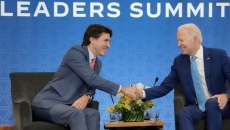The federal government is examining its approach to immigration as part of a wider look at what is driving Canada's housing crunch and what it can do about it.
The Liberal government set new immigration targets last fall that would see Canada welcome 500,000 newcomers in 2025. That compares with 341,000 immigrants arriving in 2019, and a record high of 431,645 in 2022.
Immigration Minister Marc Miller said Tuesday that at present he has no intention of adjusting that target, but that population growth fuelled by new arrivals cannot be ignored as the federal Liberal cabinet considers what is behind a worsening affordability crisis for buying or renting a home.
"I don't see a world in which (changing the target) happens but again, I'm going to be looking at the facts and I'm not a dogmatic person," he said in Charlottetown, where federal ministers are holding a three-day retreat.
"We have to look at what that impact is, and what the impact of immigrants actually is on the housing supply."
Multiple ministers, including Miller, stressed that immigrants are not to blame for Canada's housing challenges, but he said the volume of immigration, including international students, does impact the availability of housing.
"You'll find a wide divergence of views of what that impact is, of immigration on housing," he said.
"Volume is volume, and it does have an impact. There's no denying that. But the specific role that immigration plays in certain areas is something we have to kind of break down a little more."
The housing crisis is a chief topic of conversation at the retreat, which comes as the federal Liberals prepare their agenda for the fall sitting of Parliament.
The Liberals introduced a national housing strategy in 2017, promising to spend billions over a decade to restore Ottawa's involvement in building social housing. In 2019, legislation was passed designating housing as a human right.
But little progress has been made to improve the situation, and the post-pandemic cost-of-living crisis, rising interest rates and rapid population growth are exacerbating the problem.
The Canada Mortgage and Housing Corp. estimates Canada needs about 5.8 million new homes by 2030 to restore housing affordability.
In Charlottetown, ministers received a briefing on Tuesday afternoon from two national housing and homelessness experts who last week published a report identifying 10 ways the federal government could improve the situation.
That included a national housing accord between the federal government, provinces, municipalities, housing builders and not-for-profit agencies. The report pointed to a lack of co-ordination between those responsible for housing as one thing getting in the way.
On Monday, Housing Minister Sean Fraser said it was too early to commit to all 10 recommendations in the report, but that the government would be examining them and deciding what the next steps will be.
"So there's a number of different elements to what we want to do next," he said.
"How we precisely frame it, and whether that is a revisitation of the national housing strategy, is something that I'm sure we're going to get into really interesting discussions on over the course of the next couple of days here in Charlottetown," he said.
Report co-author Tim Richter, president of the Canadian Alliance to End Homelessness, said he left Tuesday's session with cabinet feeling like the housing crisis "is an issue the government is seized with."
"I got a sense of impatience and a sense of urgency," he said.
Richter and his co-authors say at least two million of the new homes that CMHC estimates are needed by 2023 should be designated as affordable housing.
Census data suggests that in 2021, about 10 per cent of the population, or 1.5 million people, were considered to be in need of affordable housing, but social housing accounts for only about 3.5 per cent of the country's housing stock.
Public Safety Minister Dominic LeBlanc said Tuesday changing the new immigration target isn't a conversation he's had with any fellow ministers, but he said the government must tailor its policies on immigration and housing to acknowledge the link between the two.
Immigration, said LeBlanc, is "essential for the economic prosperity and growth of the country" and that every premier is talking about needing more immigrants to fill jobs. That includes those needed to build houses, as the construction industry is facing a critical labour shortage.
"But we're not insensitive to the housing challenges that existed before provinces asked us to bring in more immigrants to help with the labour force," he said.
"So you have to be coherent a little bit here, but we totally accept that the conversation needs to proceed at the same time so that we don't inadvertently end up in a position that makes the housing affordability issue worse."
The government is considering possibly capping the annual number of international students issued new permits to study in Canada. Universities and colleges have been recruiting thousands of additional international students each year, who pay more in tuition fees and help schools pay their bills.
But Fraser said the schools haven't all kept pace with the housing needs associated with that extra demand and both he and Miller said putting a cap on international students may be necessary.





